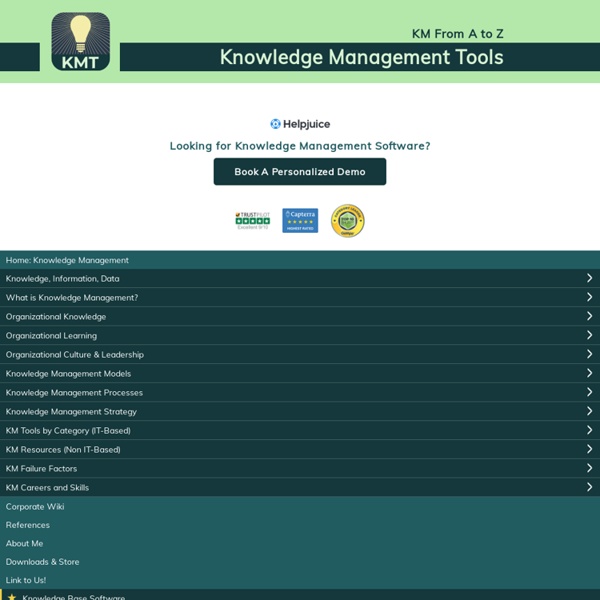



images?q=tbn:ANd9GcSaCGlJdA6zGEdsNazFwCMxtRg31GLIlNZtf-2xUtmcROoPzE0Y i-KM Management des connaissances Knowledge notes International Fund for Agricultural Development Enabling poor rural people to overcome poverty Knowledge notes This section presents a series of brief notes organized by topic within the wider subject areas of gender and household food security. The majority of the learning notes are based on original fieldwork conducted by IFAD, while others are derived from sources such as IFAD's Rural Poverty Report 2001 . Roles and activities Resources and assets Household food security Sector issues Project issues Special challenges Knowledge notes by region Hot links
KM models In this section I will examine three knowledge management (KM) models that take three very different approaches to KM. The KM Process Framework by Bukowitz and Williams (1999) This KM model depicts the process that defines the strategy for management to build, divest, and enhance knowledge assets. KM initiatives are the result of the response to tactical and strategic changes and needs. The KM Matrix by Gamble and Blackwell (2001) This KM model presents a general theoretical framework, as well as specific guidelines for implementation.. The KM process is split into four stages. As all sequential models, the steps are not to be taken literally, but they do provide an excellent overview of the role of the KM manager. The Knowledge Management Process Model by Botha et al (2008) This model attempts to offer a more realistic overview of the KM process. The model further shows which of the three categories are more people oriented and which are more technology focused. Like This Story
Le portail du KM Se procurer MindManager Sur le BLOG du KM2.0 La carte du portail Le KM en images Depuis 1998, i-KM participe à la conception et à la diffusion d'un Knowledge Management adapté à la culture économique et organisationnelle française et francophone. - Le facteur humain, et le désir de partager la connaissance pour agir, innover, construire... - Les méthodologies pour concevoir et diffuser des approches adaptées à toutes les singularités et environnements... - L'usage, enfin, des outils, plus encore que les technologies elles-mêmes... Guident notre approche, notre investissement actif et enthousiaste dans tous ces domaines qui peuvent transformer le travail, la relation, la compétitivité des entreprises, contribuer fortement à la modernisation de l'État : pourvu qu'on leur donne du sens, que l'on forme et informe, que l'on développe une véritable culture de partage et d'innovation.
Knowledge Management - APQC APQC is the place to turn for knowledge management. We helped establish knowledge management as a discipline in the 1990s and still lead the field with our innovative thinking and research. Get started today improving your knowledge management program in a range of key areas including: APQC has found knowledge management programs using solid principles gain $2 for every $1 spent—a healthy return on investment by any standard. Get trusted information and learn how to develop an effective knowledge management program through: Invest in proven guidance as you develop your organization's unique knowledge management approach. In 2014, APQC was named to KMWorld’s list of 100 Companies That Matter in Knowledge Management for the second year in a row (previous wins in 2002, 2011, and 2013). From 1998's If Only We Knew What We Know to 2011's The New Edge in Knowledge, our expertise has guided organizations in the creation of knowledge management programs.
Knowledge Management or Experience Management? One of our clients has contracted us to provide them with guidance into "Experience Management". The term "Experience Management is not a commonly defined term, so I was very interested to understand what they meant by the term (and they weren't talking about managing customer experience, which is a different field). It seems they have already investigated Knowledge Management, and have been provided with Knowledge Management solutions that deal with content management and the management of information. However even with this service, they realise that there is still something missing, namely learning from experience, sharing of experience, and the application of experience to decision making. This is the "Experience Management" they want to introduce. I think they are wisely navigating their way through the confusion around Knowledge Management; the confusion between knowledge and information, and between Knowledge Management and content management.
Small Publications Series What is this? The 'Small Publications' are intended for knowledge-sharing and dialogue within the Asian community of professionals involved in river basin management or related fields. In some cases the papers present facts, information and lessons learnt. In other cases, they provide news, opinions, ideas, or open questions for discussion. The papers are published on the Internet and promoted via CRBOM's network. Contributions are most welcome! Guide for authors ... available here (13 kb) Issues Piloting a roadmap advisory service to prepare river basin investmentsby Dennis Von Custodio (732 kb) Leadership for Asia's water development by Ravi Narayanan and Marisha Wojciechowska-Shibuya (94 kb) Strengthening Cambodia's water user communities by Yem Dararath (175 kb) Odisha's evolving water resources managementby S C Mahapatra and Marisha Wojciechowska-Shibuya (88 kb) The 2011 floods in Thailand - and the role of IWRMby Apichart Anukularmphai and Marisha Wojciechowska-Shibuya (91 kb)